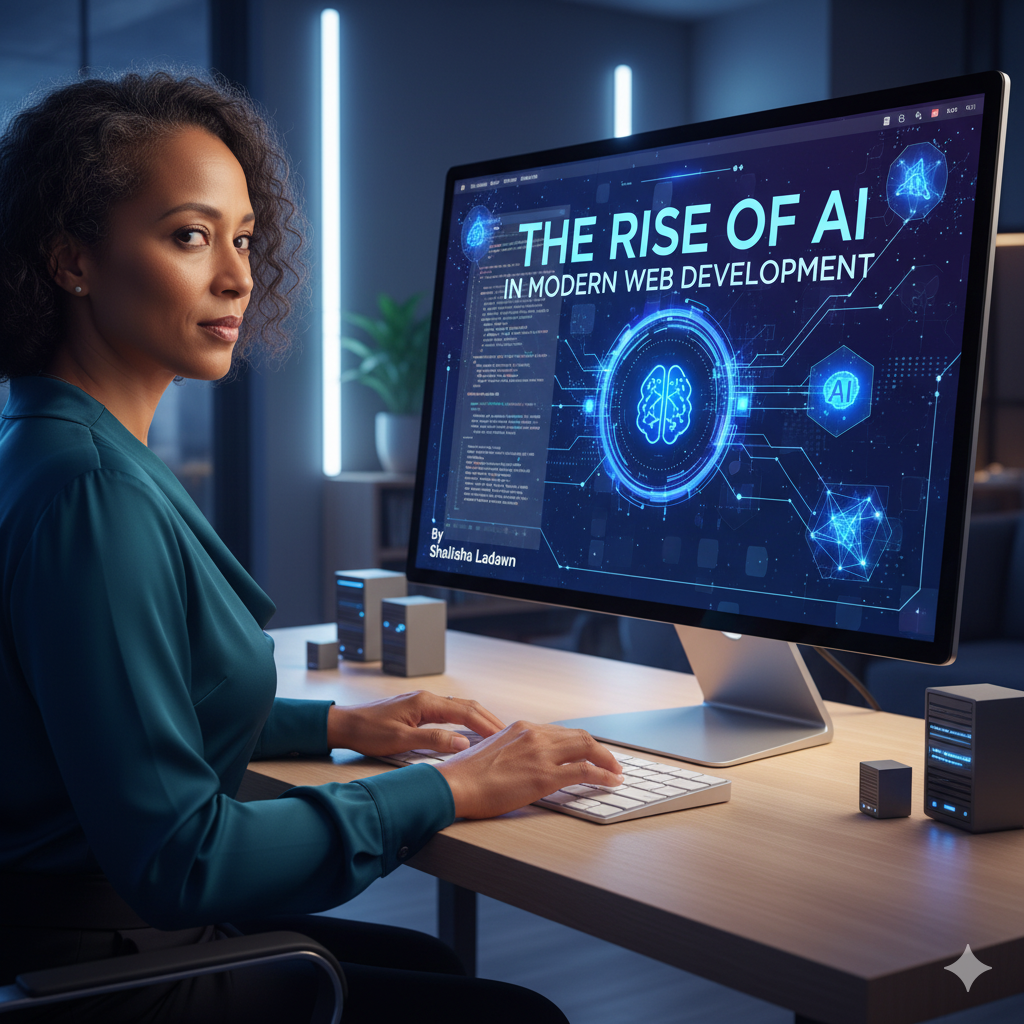The Rise of AI in Modern Web Development

Remember the internet of yesteryear, where websites stood still like digital monuments? Prepare yourself, because Artificial Intelligence is about to introduce a delightful disruption into the very core of how we craft the online world.
What's all the commotion about, you ask? It's more than mere hype. AI is no longer just a futuristic concept; it's an active agent, reshaping web development from the nuts and bolts of code to the artistry of user interface design.
Consider this your invitation to a deep exploration. We'll dissect what AI signifies for web development, trace its historical roots, consider the voices of developers immersed in this change, address the crucial ethical considerations, and peer into the technological marvels that lie just over the horizon.
II. AI 101 for Web Dev: Making Websites Smarter
At its essence, AI in web development is about amplifying the intelligence, personalization, and interactivity of websites. Think of it as equipping your web projects with an exceptionally astute assistant, capable of anticipating needs and optimizing experiences.
But who are the masterminds behind this digital magic?
- Machine Learning (ML): This is about enabling systems to evolve from data, forecasting trends and personalizing experiences.
- Natural Language Processing (NLP): Imagine websites that can comprehend human language. This is NLP at work, powering chatbots and enabling voice-activated searches.
- Data-Driven Decisions: Here, we transform vast datasets into actionable intelligence, refining design and content strategies.
- Automation Power-Up: Say farewell to the mundane. AI is taking over routine tasks, liberating developers to focus on higher-level challenges.
III. A Blast from the Past: AI's Journey to Your Browser
Let's journey back to AI's origins:
- The Dawn of AI (1950s-1970s): From Alan Turing's conceptualization of a "thinking machine" to the formal inception of "Artificial Intelligence" at Dartmouth, a new era was beginning.
- The OG Chatbot (1960s): ELIZA, the foundational chatbot, set the stage for the sophisticated conversational AI we see today.
- Early Web Whispers (Late 1990s - Early 2000s):
- Chatbots on the Scene: Remember Jabberwacky and A.L.I.C.E., early attempts at mimicking human conversation?
- Search Engine Savvy: AltaVista's early forays into NLP, followed by Google's revolutionary PageRank algorithm, redefined how we access information online.
- "You Might Also Like...": Amazon's pioneering recommendation systems laid the foundation for the personalized shopping experiences we now take for granted.
- Boom, Bust, and Breakthroughs (1980s - 2010s): The "AI winters" may have cooled enthusiasm, but the resurgence was inevitable, driven by deep learning, neural networks, and the availability of massive datasets. IBM's Watson triumphing on Jeopardy! was merely a prelude.
- The ChatGPT Effect (2020s - Present): The emergence of ChatGPT has solidified AI's role as a core technology, accelerating automation, personalization, and efficiency across the web.
IV. The Developer's Verdict: AI as a Power-Up, Not a Pink Slip
The paramount question: Is AI poised to replace developers? The resounding answer is no.
The prevailing sentiment is that AI serves as a copilot, an assistant, an augmenter — enhancing capabilities rather than substituting for human intellect. The unique blend of creativity and critical thinking that humans bring to the table remains indispensable.
The benefits are clear:
- Turbocharged Coding: Tools like GitHub Copilot accelerate code generation, debug errors, and streamline tasks, freeing developers to focus on strategic objectives.
- Design Dreams: AI-driven design tools (Uizard, Relume) conjure layouts, color palettes, and prototypes from simple instructions.
- Personal Touch: Hyper-personalized content and user journeys ensure maximum engagement.
- Quality Control: Automated testing and debugging identify issues with unprecedented speed.
- Content Creation & SEO: AI assists in generating blog content and optimizing for search engines.
The evolving landscape calls for developers who can skillfully manage and optimize AI tools, emphasizing critical thought and user-centric design.
V. The Dark Clouds: Where AI Gets Tricky in Web Dev
Yet, this bright future is not without its shadows.
- Bias in the Machine:
- The Problem: AI algorithms learn from data, and any inherent biases within that data (such as gender or racial biases) will be amplified by the AI, leading to skewed outcomes.
- The Fix: Diversifying development teams, curating balanced datasets, conducting rigorous audits, and enforcing ethical guidelines are crucial safeguards.
- Privacy Panic:
- The Data Grab: AI thrives on data, raising significant concerns about the methods of collection, storage, and application.
- Risks: Unauthorized data scraping, breaches, and the inference of personal behaviors without explicit consent pose considerable risks.
- The Balance: We must innovate responsibly, adhering to stringent data protection standards like GDPR.
- The "Black Box" Problem:
- What It Is: Many sophisticated AI models operate in ways that defy human understanding, making their decision-making processes opaque.
- Why It Matters: This lack of transparency can erode trust, complicate debugging, and obscure accountability.
- Job Jitters & the Evolving Workforce:
- The Automation Effect: The automation of routine tasks may impact entry-level positions.
- Transformation, Not Annihilation: The focus shifts from basic coding to high-level design, strategy, and collaborative efforts between humans and AI.
- Creativity Crisis?
- The Concern: Could AI homogenize website design, stifling true originality?
- The Debate: While AI excels at generating novel combinations, truly original ideas still require the spark of human ingenuity.
- Reliability Roulette: AI "hallucinations" and subtle coding errors can lead to significant issues. Blind faith in AI is not advised.
- The Green Cost: The substantial computational power required by AI carries an environmental cost.
VI. Crystal Ball Gazing: The Future of AI in Web Development
Let's envision the future:
- Beyond Personalization: Hyper-Personalization: Websites that adapt in real-time to individual moods, contexts, and preferences.
- Code That Writes Itself (Almost!): Experts predict that AI could generate a staggering 90% of code by 2026, enabling the creation of entire applications from simple text prompts.
- Self-Healing Websites: AI will automatically detect, diagnose, and resolve bugs, with testing protocols adapting to UI modifications.
- Immersive & Intuitive: The integration of AR/VR technologies, combined with voice and gesture-controlled interfaces, will transform websites into dynamic, interactive environments.
- AI Everywhere, Even on Your Device:
- Full-Stack AI: AI managing everything from front-end design to back-end database management.
- Edge AI: AI processing data locally on devices for faster responses and enhanced privacy.
- Client-Side AI: Increased AI functionality operating directly within web browsers.
- Democratizing Development: Low-code/no-code platforms will empower individuals to create sophisticated sites with AI assistance.
- The AI Designer: Generative AI for crafting 3D elements, animations, and comprehensive design concepts.
- Smarter Security: AI will serve as a vigilant digital guardian, anticipating and neutralizing cyber threats before they materialize.
VII. Embrace Your AI Partner
In conclusion, AI is transforming web development, making it faster, smarter, and more exhilarating than ever before.
Your role is not to resist this change, but to embrace it. Human creativity, empathy, and strategic thinking remain paramount.
Future-proof your skills by mastering AI tools and focusing on high-level problem-solving. The rise of AI is not the end of web developers, but the dawn of a new era filled with possibilities.


janimani
October 4, 2025 at 7:12 am
hello there..
Jugrun josh
October 4, 2025 at 6:47 am
best of ai.
Simon Sinek
October 4, 2025 at 6:43 am
Thanks for this valuable insights.